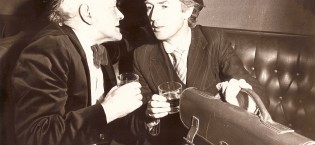Sligo Drama Circle in “The Evidence I Shall Give”
Sligo Drama Circle, with their eighth production, “The Evidence I Shall Give”, a three-act play by Richard Johnson, really surpassed themselves this year and for sheer atmosphere, tempo and acting it will rest in the memories of the people who saw it for a long, long time. For the four nights in which it was staged in the Gillooly Hall, Sligo, patrons demonstrated their appreciation with rounds of applause at regular intervals throughout. Reading the back page of the programme one was informed that their next production will be in March next year and if they rise to the heights they attained with their latest production they can feel well satisfied.
In this play there was a cast of twenty-two and to producer Eric Gregan must go a big vote of congratulations for the magnificent manner in which his players carried, moved and expressed themselves. Every part was suitably filled by members of the cast with, it almost seemed, a natural inclination for the respective roles they played. There were a number of minor roles played by talented Sligo actors and these short comical cameos raised the standard considerably, particularly in the first act when we had two characters on stage who would have brightened any show with their portrayals. We had also difficult scenes, particularly the last one, where the right atmosphere and pitch had to be reached but this was done imperceptibly and the peak of tenseness which this act reached was only realised afterwards.
The scene for the entire play was that of a District Courtroom in the town of Barrabeg in the Breac-Ghaeltacht and besides six summonses by the local Sergeant we had three more cases, that of a French fisherman being caught fishing inside the three mile limit; a young man refusing to pay maintenance to a girl, and an order being sought by the nuns of a girls’ reformatory for the committal of a girl to an industrial school for consistent breaches of rules and regulations. Gerry Boyle, who played the Assistant Courthouse Keeper, Polly O’ Grady, set the pace for the night. As a stand-in for the regular keeper she was interested in everything and she enhanced her performance in the duologue with the Court Clerk, played by Joe Meehan, who throughout the play gave a very good performance.
The three nuns, Rev. Mother General (Marie Mulvihill); Mother Cecilia (Raphie O’ Rourke) and Sr. Mary (Ann Bourke) were excellently portrayed, particularly Mother Cecilia who culminated her performance of a nun lacking maternal instincts very realistically in the last act. The impression these three players gave when they were on the stage was excellent and their movements were very good. Monica Toher, as the interpreter, succeeded in conveying her part over to the audience while Colette Mc Caffrey as Margaret Raffigan, the girl who was causing all the trouble in the reformatory, was convincing and she really excelled in the last act. We had three solicitors who throughout the play were superb. Haranguing between themselves, in cross-examination, presence, mood, all the necessary requirements to produce the professional atmosphere were present and Brian Bohan (Mr. Verity), Vivian Francis (Mr. Burr, State Solicitor) and Jimmy Gilmartin (Mr. Green) must take a second a second bow for their acting. In the last scene when the cross-examination of Mother Cecilia took place, Brian Bohan really excelled himself.
Garda O’ Driscoll, played by Denis Barrett; District Justice Mc Henry, played by Dominic Mc Govern, and Supt. O’ Flanagan, played by Joe Flood, fitted excellently into their respective parts and as the District Justice, Dominic Mc Govern, a bit youthful looking, perhaps, was well able to portray the genial yet stern Justice. Three who caused bursts of delighted laughter from the audience were Eddie Mc Dermottroe as Patrick Sinnott; Eddie Fitzpatrick as Peter Mc Clane and Lionel Gallagher as the easy beat kid, Maguire. This trio infused plenty of gusto into their parts and with each exit the three of them received a round of well-deserved applause.
We are now left with four characters, Lottie Bourke as Mrs. Browne; Liam Mc Kinney as, her son Jeremiah; Michael Gunning as Sgt. Bornican and Eric Gregan as Jean Omer, a French fisherman. Lottie Bourke should find it exceedingly difficult to surpass this performance. As the clutching mother she gave a terrific portrayal and her manner during the whole play fitted the character she played exceedingly well. In the last act she concluded a brilliant showing when she stood in the witness box vainly trying to evade the questions of the Justice, grasping at the slight chance which had left her in charge of the lucrative farm which was rightly her son’s. Liam Mc Kinney, as Jeremiah Browne, a skulking individual content to be ruled over by his mother and to tread the primrose path, was delightfully portrayed. He, too, ended his part on a high note when he realised that his mother was more interested in the money from the farm than in his welfare
It would be very hard to describe Michael Gunning as Sgt. Bornican and Eric Gregan as the French fisherman. The two of them, particularly in the scene where Sgt. Bornican, who had honours in his Intermediate Certificate in French endeavoured, in vain, to interpret Mons. Omer’s remarks when the fisherman was first brought into the courtroom. His perplexity grew to larger proportions when he tried to read what Mons. Omer had written on a piece of paper, and he wasn’t helped in any way by the “congratulations” remark from the Justice after he had got Mons. Omer to understand one thing. Michael Gunning played his part subtly and with plenty of expression. In the part where he tries to rush through his six summonses in order to get to the nearest tur accountants to back a horse, he was particularly good.
Eric Gregan as Jean Omer, the French fisherman arrested for fishing for lobsters within the three mile limit, was excellently played and his gestures rounded off by the burst of effusiveness to the Sergeant after his case had been dealt with added the final touches to a first-class characterisation. Seán Kilfeather played the Press Reporter at the court proceedings. Producer was Eric Gregan; Stage Managers: Lionel Gallagher and Una Lappin; Settings: Eric Gregan and John Mc Ananey; Lighting: Joe Lally; Costumes: Virginia Vine Ltd., Dublin.
from The Sligo Champion, December 29th, 1962
Tags: History, Press Reports, Productions, Reviews, Richard Johnson








